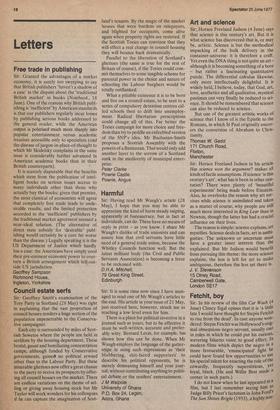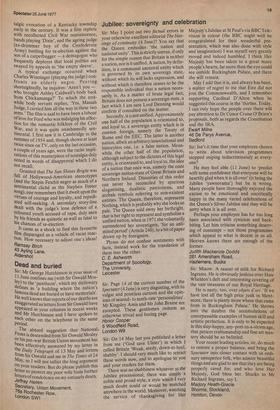Fetchit, boy
Sir: In his review of the film Car Wash (4 June) Clancy Sigal opines that it is 'a little late I would have thought for Stepin Fetchit to rise from the dead'. In case anyone wondered: Stepin Fetchit was Hollywood's original obsequious negro servant, usually cast in roles in which he could put his curious, wavering falsetto voice to good effect. In modern films which depict the negro in a more favourable, 'emancipated' light he could have found few opportunities to use his special talent for enacting the role of the cowardly, frequently superstitious, yet loyal, black. (He and Willie Best made a corner in such parts.) I do not know when he last appeared M a film, but I last remember seeing him as Judge Billy Priest's factotum in John Ford's The Sun Shines Bright (1953), a highly nes
talgic evocation of a Kentucky township early in the century. It was a film replete with recollected Civil War reminiscence, bands playing 'Dixie', and the ageing judge (ex-drummer boy of the Confederate Army) battling for re-election against the son of a carpetbagger — a demagogue who frequently deplores that local politics are swayed by appeals to 'the empty sleeve'. A typical exchange occurred when Charles Winninger (playing the judge) confronts an elderly negro. Peering shortsightedly, he inquires: 'Aren't you — who brought Ashley Caldwell's body back from Chickamanga?' To which the erstwhile body servant replies, 'Yes, Massah Judge, I carried him all the way in these two arms.' The film is said to have been a labour of love for Ford who was indulging his affection for the romantic folklore of the Civil War, and it was quite unashamedly sentimental. I first saw it in Cambridge in the summer of 1954 and, though shown at least twice since on TV, only on the last occasion, a couple of years ago, were the racist implications of this masterpiece of nostalgia duly noted in words of disapproval which I do not recall.
Granted that The Sun Shines Bright was full of Hollywood-American stereotypes (and the Stepin Fetchit negro as much of a sentimental cliché as the Stephen Foster s(?ng), one remembers that it dwelt upon the virtues of courage and loyalty, and repudiated self-seeking. A secondary story-line dealt with the judge's lone defence of a coloured youth accused of rape, duly seen by his friends as quixotic as well as fatal to his chances of re-election. It came as a shock to find this favourite disparaged as a vehicle of racist reacbon. How necessary to adjust one's ideas! Ramsay Birch 43 Ayling Lane, Aldershot















































 Previous page
Previous page